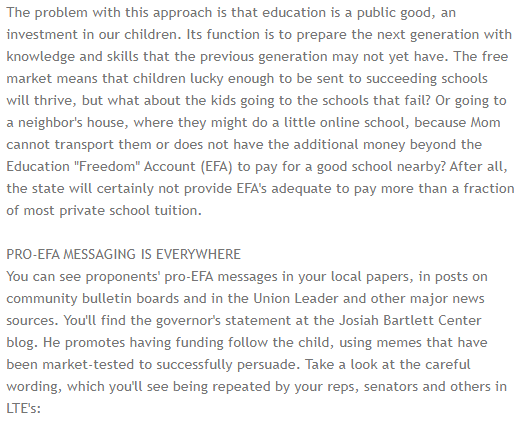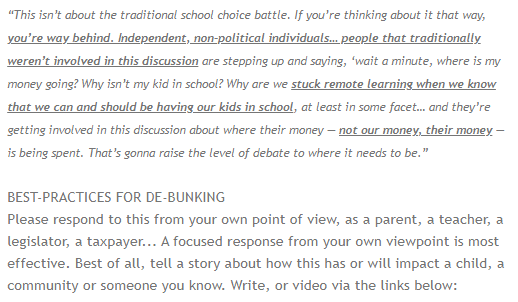The Granite Crock group recently sent out an email blast soliciting ‘fact checks’ from its members to ‘debunk’ support for Education Freedom Accounts, which they see as a threat to public school funding. But it’s the email itself that needs debunking.
Related: Education Freedom Accounts
The first thing to note is that the authors don’t actually understand the thing they think they’re arguing against. The nature of Education Freedom Accounts, or Education Spending Accounts, or whatever else you want to call them, is that they are add-ons to the current system, rather than replacements for any part of the system. Money placed into these accounts increases overall spending on education, rather than shifting it around — something that doesn’t appear to be understood by people on either side of the issue.
Careful readers (see below) will notice that the entire pitch rests on a two-step bait-and-switch. The first step begins by making the claim that ‘education is a public good’. That’s true enough. By definition, a public good is non-excludable (no one can prevent you from becoming educated), and non-rivalrous (one person’s getting an education doesn’t prevent anyone else from getting one).
But the rest of the pitch isn’t about education at all. It’s about schools. And schools do not meet the definition of ‘public good’. They are simply one particular method of trying to bring about education — an 18th-century solution to a 21st-century problem. (Schools are to education what leeches are to medicine.)
That’s the first switch. The second is making an unstated assumption that a public good is the same thing as a tax-funded entitlement. But it’s not.
What this means is that the subsequent ‘arguments’ that the email makes against EFAs — or for public schools, or about anything else — are irrelevant, in much the same way that, having established that evil spirits do not cause diseases, arguments about which kinds of spirits cause which diseases, and how to banish them, aren’t really worth examining in any detail, let alone responding to point-by-point.
But it is worth examining the role of education — as opposed to schools — in society. And to do that, it’s useful to think about the role of arms in society.
Many people are surprised by this, but take a look at the language of Amendment 2 to the federal constitution,
A well-regulated Militia, being necessary to the security of a free State, …
and then at the language of Article 83 of the state constitution
Knowledge and learning, generally diffused through a community, being essential to the preservation of a free government, …
When you do this, it becomes clear that the two articles make essentially the same claim about both arms and education. Namely, if free people want to remain free, they need to be both armed and educated.
Now, does it follow that it’s the government’s job to provide anyone with knowledge and learning? No more than it’s the government’s job to provide anyone with arms and training in arms. Like being armed, being educated isn’t something you’re entitled to. It’s something you’re responsible for.
Where both arms and education are concerned, the government’s role is mainly to stay the hell out of the way. Because the last thing free people should ever do is hand their government control over the tools they need to defend themselves against that government, i.e., let the fox guard the henhouse.
So where do schools fit into all this? They don’t, really. The state supreme court has defined an ‘adequate education’ as one that provides
each educable child an opportunity to acquire the knowledge and learning necessary to participate intelligently in the American political, economic, and social systems of a free government.
In a world where educational resources like books and teachers were scarce, providing such an opportunity required active steps, i.e., bringing kids to central locations where they could share those resources. But we don’t live in that world anymore.
In the world where we live, anyone with a smartphone and an internet connection is a few clicks away from the collected knowledge of mankind, and queues of people who will teach you anything you want to learn, more often than not for free.
In the world in which schools were invented, opportunities to acquire knowledge required you to travel to where they were.
In the world where we live now, those opportunities are literally falling from the sky around you, wherever you happen to be, and whenever you want them. (Unless you’re in school, where your normal access to such resources is severely limited.)
So to say that education requires ‘better schools’ is a little like saying that commerce requires faster horses and longer-lasting candles.
One of the accidental benefits of the current panic over re-opening schools is that it’s laying bare the dangers of the traditional school model, in which we spoon-feed students in central locations, instead of focusing on developing as early as possible the abilities of those students to learn on their own — to take responsibility for educating themselves — wherever they happen to be.
Another benefit is that it’s making clear how little of what happens in schools is about providing education to students, and how much is about providing daycare for parents. That’s creating openings for a discussion that we desperately need to have.
Which is to say, the government’s spastic, lurching over-reaction to COVID-19 is handing us unprecedented opportunities that we’d be fools to squander.
To summarize: EFAs, or similar educational ‘accounts’, will do nothing to decrease spending on public schools. This is too bad, because spending on public schools really does need to be decreased… to zero.
Original Email:




